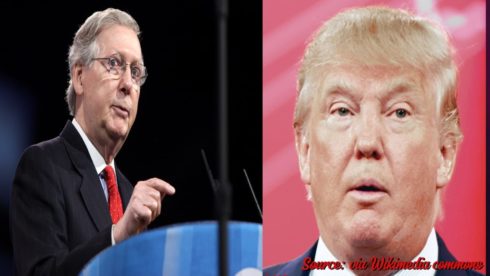Senate Minority Leader Mitch McConnell openly opposed former President Donald Trump’s proposed tariffs, sparking outrage within the MAGA community. Speaking to reporters, McConnell labeled Trump’s 200% tariff on John Deere tractors manufactured in Mexico as a “complete disaster” for the American economy. The statement marks a significant break between McConnell and Trump on economic policy, as the Senate leader sided with economists who predict dire consequences for American consumers.
Mitch McConnell’s comments reflect growing concerns within the Republican establishment over Trump’s aggressive tariff strategy. Many worry that imposing steep tariffs could drive up the cost of everyday goods, negatively impacting working-class Americans and hurting key sectors like agriculture and manufacturing. Mitch McConnell’s open rejection of tariffs highlights a growing divide within the GOP on trade policies.
Mitch McConnell: “I’m Not a Fan of Tariffs
When asked by a reporter whether Trump’s 200% tariff on tractors made in Mexico would harm American consumers, Mitch McConnell didn’t hold back. “Yeah, I’m not a fan of tariffs,” he admitted, signaling his disapproval of the economic strain such policies could impose. While Trump’s tariffs may play well with his base, Mitch McConnell argued that they hurt American consumers by raising prices and limiting the availability of affordable goods.
Mitch McConnell, known for his consistent support of free trade policies, emphasized that tariffs work against the interests of ordinary Americans. His rejection of tariffs sets him apart from Trump’s “America First” approach, as he prioritizes the economic stability created by international trade. For Mitch McConnell, supporting free trade remains central to creating jobs and keeping consumer prices low.
Economic Experts Agree: Trump’s Tariffs Would Backfire
Economists across the political spectrum have long warned of the damaging effects of high tariffs. McConnell’s critique reflects widespread concern that Trump’s tariffs would raise costs for consumers without providing substantial benefits. A 200% tariff on John Deere tractors, for example, could drastically increase equipment prices for farmers, leading to higher food costs nationwide. Such a move would disproportionately affect rural Americans—many of whom form the backbone of Trump’s voter base.
Beyond agriculture, other industries dependent on cross-border manufacturing and trade could also suffer under a heavy tariff regime. By driving up production costs, tariffs reduce the competitiveness of American goods in global markets. Mitch McConnell’s concerns are echoed by experts who argue that tariffs could weaken the U.S. economy rather than protect it.
MAGA Backlash: Mitch McConnell Faces Criticism from Trump Supporters
Unsurprisingly, Mitch McConnell’s comments were met with immediate backlash from Trump loyalists. The MAGA movement, which has coalesced around Trump’s economic nationalism, has little patience for Republican leaders who stray from the former president’s policies. Many Trump supporters believe tariffs are essential to protecting American manufacturing jobs and ensuring national security, and McConnell’s stance is seen as a betrayal.
Social media erupted with criticism from MAGA influencers and commentators, many of whom accuse Mitch McConnell of being out of touch with the base. Some have even called for his resignation. Mitch McConnell’s willingness to publicly oppose Trump, however, signals that a faction of the GOP remains committed to traditional conservative principles, such as free trade.
Free Trade vs. Economic Nationalism: A Deepening GOP Divide
Mitch McConnell’s sharp critique of Trump’s tariffs highlights a deepening ideological divide within the Republican Party. On one side are the traditional free-market conservatives like Mitch McConnell, who believe that free trade agreements boost economic growth, create jobs, and reduce consumer costs. On the other side are the economic nationalists aligned with Trump, who argue that tariffs are necessary to protect American industries from foreign competition.
This conflict reflects broader tensions over the GOP’s future direction. As the 2024 election approaches, Republican leaders will need to reconcile these competing visions for the economy. Mitch McConnell’s rejection of tariffs indicates that the free-trade wing of the party is not ready to concede ground to Trump’s economic populism.
The Real Impact of Tariffs: Higher Prices for Americans
At the heart of Mitch McConnell’s critique is the simple economic fact that tariffs raise costs for consumers. By imposing high tariffs on imported goods, Trump’s policies would force American companies to either raise prices or absorb the increased costs. For everyday Americans, this could mean higher prices on everything from tractors to household goods, exacerbating inflation and reducing purchasing power.
In contrast, Mitch McConnell and other free-trade advocates argue that maintaining open markets allows consumers to access a wide range of affordable goods. Rather than imposing artificial barriers through tariffs, McConnell believes that American competitiveness can best be preserved through innovation and trade expansion. His stance reflects the broader debate over how best to protect American workers without sacrificing economic prosperity.














